As Peter Ridd case shows, pursuit of truth not always a civil affair

The dispute arose out of comments made by Ridd on research dealing with climate change and its effects on the Great Barrier Reef. Ridd has deep concerns about the accuracy and quality of this research, and has publicly criticised the Australian Research Council Centre of Excellence in Coral Reef Studies at JCU and the Great Barrier Reef Marine Park Authority.
Ridd went well outside polite academic forums in expressing his concerns. He was also forceful in his criticisms, and used blunt and direct language not usually found in scholarly debate. For example, Ridd participated in an interview on Sky News in which he said “we can no longer trust” scientific institutions in the area and that the scientists involved were not being objective about their work. He alleged “the science is coming not properly checked, tested or replicated”. His criticisms were serious and damaging in questioning whether research findings could be trusted.
Ridd might have thought he was protected in making these comments. Universities have made it clear academic freedom is a paramount value, and even at its most basic level the freedom must include a right to challenge research findings. This was reflected in the enterprise agreement for academic employment at JCU, which referred to staff having “intellectual freedom”. It went on to say employees can “participate in public debate and express opinions about issues and ideas related to their respective fields of competence”, “express opinions about the operations of JCU”, and “express unpopular or controversial views”.
The matter is not straightforward because this was not the only document at JCU dealing with academic matters. JCU also had in place a code of conduct imposing minimum standards of behaviour for staff. These include that staff “enquire, examine, criticise and challenge in the collegial and academic spirit of the search for knowledge, understanding and truth”, “behave in a way that upholds the integrity and good reputation of the university” and treat others with “honesty, respect and courtesy”. The code of conduct permits staff to be disciplined for failing to meet these standards.
In responding to Ridd’s public criticisms, JCU gave priority to its code of conduct over the enterprise agreement. It took action beginning with formal censures and culminating in Ridd’s dismissal. He was found to have breached the code of conduct on multiple grounds, including that he had not acted in a “collegial and academic spirit” and that his treatment of others was disrespectful and discourteous.
Ridd took the matter to court. He accepted that he had breached the JCU code of conduct, but said the university had no right to dismiss him because he was exercising his intellectual freedom in accordance with the enterprise agreement. Ridd succeeded in the Federal Circuit Court, but lost on appeal when the full Federal Court sided with JCU.
The case will reach Australia’s highest court this week in what may be the most important decision yet handed down on freedom of speech in our universities. In material filed with the High Court, Ridd is pressing the necessity of intellectual freedom to the work of universities. He argues that universities cannot pursue knowledge for the public good without this freedom. After all, human knowledge is fallible and so must always be subject to contest and debate. As recognised in the JCU enterprise agreement, academics must be free to challenge orthodoxy and even criticise their employer.
By contrast, JCU argues that the enterprise agreement recognises intellectual freedom but does not confer academics with this right. In effect, intellectual freedom is mentioned in the agreement, but not in any meaningful way that protects Ridd’s freedom of speech. As a result, JCU was entitled to apply its code of conduct to dismiss Ridd for his discourteous and disrespectful criticism of other academics.
The High Court decision could turn on a range of grounds, as shown by the conflicting decisions of the courts below. The court might find for JCU on technical legal grounds because the enterprise agreement fails to further explicit rights to intellectual freedom. Or, the court might view this freedom as a fundamental aspect of what it means to be a university, and so give primacy to this to prevent academics from being disciplined for criticising the work of others.
The fact that the outcome is so uncertain and, indeed, that the case is on foot in the first place demonstrates weaknesses in the protection of academic freedom. The ability of academics to publicly debate and question the quality of research should not be in doubt. We should also not expect that academics will always act politely and within civilised bounds. In the pursuit of truth, heated and sometimes intemperate debate is to be expected. Academics and universities need to be tolerant of sharp criticism and avoid the temptation to shut down debate.
George Williams is a Deputy Vice-Chancellor and Professor of Law at the University of NSW.



Freedom of speech in the nation’s universities will again be in the spotlight this week. The High Court will hear an appeal on Wednesday by Professor Peter Ridd against his dismissal by James Cook University. Ridd lost his job after publicly criticising other academics and their research. The High Court will determine whether his dismissal was lawful after 27 years with the institution.